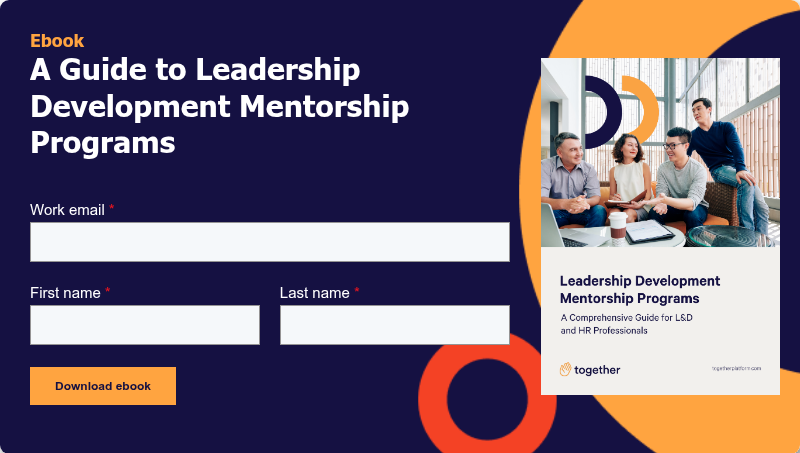Here's a scenario that plays out in organizations everywhere: You've carefully selected experienced mentors, designed a structured program, and launched with great fanfare. Six months later, you're seeing mixed results. Some mentoring relationships are thriving and producing remarkable leadership growth. Others are struggling with unclear goals, mismatched expectations, and frustrated participants.
What makes the difference? Often, it's not the mentors or the program structure—it's how well you've prepared the mentees for success.
According to research from the National Library of Medicine on leadership mentorship programs, participants who are properly prepared report increased leadership awareness, stronger motivation, better stress-coping mechanisms, and greater confidence as leaders. But preparation goes far beyond a simple orientation session.
This guide will show you how to select, onboard, and support mentees in ways that maximize their leadership development and create transformational mentoring experiences.
Understanding the mentee success factors
Before diving into selection criteria and onboarding processes, it's important to understand what distinguishes mentees who thrive in leadership mentorship from those who struggle.
The growth mindset foundation
The most successful mentees approach mentorship with what psychologist Carol Dweck calls a "growth mindset"—the belief that abilities and intelligence can be developed through effort, learning, and persistence. In the context of leadership mentorship, this translates to:
Embracing challenges as learning opportunities:
- Viewing difficult leadership situations as chances to grow
- Seeking feedback actively rather than avoiding it
- Experimenting with new approaches and behaviors
- Learning from failures and setbacks
Taking ownership of their development:
- Setting clear, specific goals for their growth
- Coming prepared to mentoring sessions with questions and topics
- Following through on commitments and action items
- Seeking additional resources and learning opportunities
Remaining open to different perspectives:
- Listening to feedback without becoming defensive
- Considering approaches that differ from their natural style
- Learning from diverse experiences and viewpoints
- Adapting their behavior based on new insights
Readiness for leadership development
Not every high-potential employee is ready for intensive leadership mentorship at any given moment. The most successful mentees demonstrate specific indicators of readiness:
Career motivation and direction:
- Clear aspirations for leadership roles and responsibilities
- Understanding of what leadership development requires
- Willingness to invest time and energy in growth
- Alignment between personal goals and organizational opportunities
Self-awareness and reflection capabilities:
- Understanding of their current strengths and development areas
- Ability to reflect on their experiences and extract learning
- Awareness of their impact on others
- Recognition of their own learning style and preferences
Interpersonal skills foundation:
- Basic communication and relationship-building abilities
- Comfort with giving and receiving feedback
- Ability to work effectively with diverse personalities
- Understanding of professional boundaries and appropriate behavior
Strategic mentee selection process
Just as it’s important to choose and prepare the right mentors for leadership development, your mentee selection process should identify individuals who will benefit most from mentorship while ensuring diversity and alignment with organizational goals.
Primary selection criteria
High potential for leadership advancement: Look for employees who have demonstrated leadership potential through their work, even if they haven't held formal leadership roles:
- Strong performance in their current role
- Initiative in taking on additional responsibilities
- Influence and credibility with peers and colleagues
- Problem-solving abilities and strategic thinking skills
Commitment to professional development: Mentorship requires significant time and energy investment from mentees:
- History of seeking learning and development opportunities
- Willingness to invest time in mentoring meetings and activities
- Understanding of what mentorship involves and requires
- Support from their current manager for participation
Openness to feedback and change: Leadership development requires honest self-assessment and behavior change:
- Track record of acting on feedback and coaching
- Willingness to step outside their comfort zone
- Ability to acknowledge areas where they need to grow
- Resilience in the face of challenges and setbacks
Clear development goals: The most successful mentees have specific objectives for their growth:
- Identified leadership competencies they want to develop
- Career aspirations that align with mentorship opportunities
- Specific challenges they're facing that mentorship can address
- Understanding of how mentorship fits into their broader development plan
Secondary selection criteria
Organizational readiness: Consider the timing and context for each potential mentee:
- Current role stability and performance
- Upcoming opportunities for applying new skills
- Manager support for their development and participation
- Workload and availability for meaningful engagement
Diversity and inclusion considerations: Build a mentee pool that reflects your organization's diversity goals:
- Representation across different demographic groups
- Variety of functional areas and career paths
- Mix of experience levels and leadership development needs
- Inclusion of different learning styles and preferences
Cultural fit and values alignment: Select mentees who embody your organization's values:
- Demonstration of core organizational values in their work
- Collaborative approach to working with others
- Integrity and professionalism in their interactions
- Commitment to the organization's mission and goals
Application and assessment process
Comprehensive application process: Gather detailed information about potential mentees:
- Current role responsibilities and performance
- Career aspirations and development goals
- Previous development experiences and outcomes
- Specific areas where they're seeking mentorship support
- Time availability and commitment to the program
Manager nomination and support: Ensure manager engagement in the process:
- Manager endorsement of their participation
- Discussion of how mentorship will support their current role
- Alignment between mentorship goals and performance objectives
- Manager commitment to providing support and flexibility
Behavioral assessment: Use interviews or assessment tools to evaluate readiness:
- Scenarios testing their openness to feedback
- Questions about their approach to learning and development
- Discussion of challenges they've faced and how they've responded
- Exploration of their communication style and preferences
Comprehensive mentee onboarding
Once you've selected your mentees, comprehensive onboarding sets the foundation for successful mentoring relationships and meaningful development outcomes.
Program overview and expectations
Clear program structure: Help mentees understand exactly what they're committing to:
- Program duration, timeline, and key milestones
- Meeting frequency and format expectations
- Available resources and support systems
- Success metrics and evaluation processes
Role clarification: Define what's expected of mentees throughout the program:
- Preparation requirements for mentoring sessions
- Goal-setting and progress tracking responsibilities
- Communication protocols and professional standards
- Confidentiality and boundary expectations
Success factors: Share what typically leads to successful mentoring outcomes:
- Active participation and engagement in sessions
- Consistent follow-through on commitments and action items
- Openness to feedback and willingness to try new approaches
- Proactive communication about challenges and needs
Goal setting and development planning
Individual development planning: Work with each mentee to create specific development objectives:
- Assessment of current leadership competencies
- Identification of specific growth areas and priorities
- Clear, measurable goals with timeline and success criteria
- Connection between mentorship goals and career aspirations
SMART goal framework: Teach mentees to set goals that drive meaningful development:
- Specific: Clear, well-defined objectives
- Measurable: Quantifiable indicators of progress
- Achievable: Realistic given their current situation
- Relevant: Aligned with their role and career goals
- Time-bound: Clear deadlines and milestones
Development planning tools: Provide frameworks and resources for ongoing planning:
- Individual development plan templates
- Leadership competency assessment tools
- Goal tracking and progress monitoring systems
- Resource libraries for self-directed learning
Relationship preparation
Mentoring relationship dynamics: Prepare mentees for successful mentor interactions:
- Understanding different mentoring styles and approaches
- How to build trust and rapport with their mentor
- Effective communication techniques for mentoring conversations
- Managing expectations and addressing challenges
Conversation skills: Develop capabilities that enhance mentoring discussions:
- Asking powerful questions that drive insight
- Active listening and reflection techniques
- Sharing experiences and challenges authentically
- Receiving and acting on feedback constructively
Professional boundaries: Establish appropriate guidelines for the relationship:
- Confidentiality expectations and limitations
- Professional vs. personal relationship boundaries
- Appropriate topics for mentoring conversations
- How to address conflicts or mismatched expectations
Ongoing support and development
Effective mentee support doesn't end with onboarding. The most successful programs provide continuous guidance and resources throughout the mentoring relationship.
Regular check-ins and progress monitoring
Structured progress reviews: Build regular touchpoints to assess mentee development:
- Monthly one-on-one check-ins with program coordinators
- Quarterly goal review and adjustment sessions
- Mid-program comprehensive development assessment
- Regular feedback collection on mentoring relationship quality
Peer learning opportunities: Connect mentees with others in similar development journeys:
- Monthly mentee cohort meetings for shared learning
- Peer coaching partnerships for additional support
- Group workshops on leadership development topics
- Networking events connecting current and former mentees
Just-in-time support: Provide targeted assistance when mentees encounter challenges:
- Quick consultation availability for urgent questions
- Resource recommendations for specific development needs
- Conflict resolution support for relationship challenges
- Coaching on difficult conversations or feedback delivery
Skills development and learning resources
Leadership competency development: Supplement mentoring with targeted skill building:
- Workshops on specific leadership capabilities
- Assessment tools for self-awareness and growth tracking
- Reading lists and online learning resources
- Application exercises and practice opportunities
Practical application support: Help mentees apply their learning in real-world situations:
- Action learning projects aligned with development goals
- Stretch assignments that build leadership capabilities
- Cross-functional collaboration opportunities
- Presentation and visibility platforms
Feedback and reflection tools: Provide mechanisms for continuous learning and improvement:
- 360-degree feedback processes
- Regular self-reflection exercises and journaling prompts
- Peer feedback opportunities and structured conversations
- Learning capture tools for documenting insights and progress
Managing expectations effectively
Clear, realistic expectations prevent disappointment and ensure productive mentoring relationships. Address these key areas explicitly with all mentees.
What mentorship can and cannot do
Realistic mentorship outcomes: Help mentees understand what mentorship can realistically provide:
- Guidance, perspective, and insights from experienced leaders
- Support in developing specific leadership competencies
- Networking opportunities and organizational knowledge
- Accountability and encouragement for growth efforts
- Safe space to discuss challenges and explore solutions
What mentorship cannot provide: Be clear about mentorship limitations to prevent unrealistic expectations:
- Guaranteed promotions or specific career advancement
- Solutions to all leadership challenges or workplace problems
- Replacement for their own effort and leadership skill development
- Protection from difficult feedback or performance issues
- Shortcuts to leadership expertise and experience
Time investment and commitment expectations
Mentee time requirements: Provide clear guidelines about time investment:
- Monthly mentoring meetings (60-90 minutes each)
- Preparation time for each session (30-45 minutes)
- Follow-up actions and skill practice between meetings
- Participation in program events and group activities
- Self-directed learning and development activities
Quality over quantity: Emphasize that engagement quality matters more than time spent:
- Coming prepared with specific questions and topics
- Active participation in conversations and exercises
- Following through on commitments and action items
- Applying insights and feedback in their daily work
- Reflecting on experiences and sharing learning with their mentor
Relationship dynamics and boundaries
Professional relationship expectations: Establish clear guidelines for appropriate interactions:
- Focus on professional development and leadership growth
- Maintain confidentiality within appropriate boundaries
- Respect both parties' time constraints and availability
- Address conflicts or misalignments constructively
- Transition relationships appropriately when the program ends
Communication protocols: Set standards for effective mentoring interactions:
- Regular, consistent meeting schedules
- Advance preparation and agenda setting
- Respectful, professional communication
- Timely follow-up on commitments and action items
- Open dialogue about relationship effectiveness and adjustments needed
Common mentee challenges and solutions
Understanding typical mentee challenges allows you to provide proactive support and intervention when needed.
Challenge 1: Unclear or vague goals
The problem: Many mentees enter programs with general aspirations like "become a better leader" without specific development objectives.
The solution:
- Provide structured goal-setting workshops and templates
- Require specific, measurable development objectives
- Connect goals to real workplace challenges and opportunities
- Review and refine goals regularly based on progress and changing needs
Challenge 2: Passive approach to learning
The problem: Some mentees expect mentors to provide all the direction and solutions rather than taking ownership of their development.
The solution:
- Train mentees on their responsibilities in the relationship
- Require preparation and agenda-setting for mentoring sessions
- Emphasize self-directed learning and skill practice
- Provide tools and frameworks for proactive development planning
Challenge 3: Difficulty receiving feedback
The problem: Mentees may struggle with constructive feedback, becoming defensive or dismissive of growth suggestions.
The solution:
- Include feedback skills in mentee training and onboarding
- Practice feedback scenarios in safe group settings
- Provide frameworks for processing and acting on feedback
- Create accountability systems for applying feedback insights
Challenge 4: Time management and prioritization
The problem: Busy mentees may struggle to prioritize mentorship activities among competing demands.
The solution:
- Work with managers to align mentorship with job priorities
- Provide time management strategies specific to development activities
- Break down large development goals into manageable daily actions
- Celebrate small wins and progress to maintain motivation
Challenge 5: Lack of confidence or imposter syndrome
The problem: Some mentees, particularly from underrepresented groups, may struggle with confidence in leadership development settings.
The solution:
- Address confidence building explicitly in program design
- Provide diverse mentor and role model representation
- Create peer support networks for shared experiences
- Celebrate achievements and progress regularly
Measuring mentee success and development
Tracking mentee progress and outcomes provides valuable data for program improvement and demonstrates the impact of your mentorship efforts.
Individual development metrics
Goal achievement and progress:
- Completion rates for specific development objectives
- Progress toward leadership competency improvements
- Application of new skills and behaviors in workplace settings
- Self-assessed confidence and capability increases
Behavioral changes and application:
- 360-degree feedback improvements over time
- Manager observations of leadership behavior changes
- Peer feedback on collaboration and influence effectiveness
- Self-reported changes in leadership approach and effectiveness
Program-level success indicators
Engagement and completion:
- Program completion rates and participant retention
- Meeting frequency and consistency between mentor-mentee pairs
- Participation rates in optional program activities and events
- Satisfaction scores for program components and overall experience
Career advancement outcomes:
- Promotion rates for program participants vs. non-participants
- Internal mobility and leadership role transitions
- Retention rates and employee engagement scores
- Leadership pipeline strength and succession planning readiness
Long-term impact assessment
Career progression tracking:
- Follow up with mentees 6-12 months after program completion
- Track leadership role advancement over 2-3 year periods
- Monitor continued development and skill application
- Assess sustained behavior changes and growth mindset
Organizational impact:
- Contribution to leadership bench strength and succession planning
- Impact on team performance and employee engagement
- Role in organizational change and transformation initiatives
- Influence on organizational culture and development practices
Building a culture of mentee success
The most effective mentorship programs create an organizational culture that supports and celebrates mentee development at every level.
Manager engagement and support
Manager preparation and buy-in:
- Train managers on their role in supporting mentee development
- Align mentorship goals with performance management objectives
- Provide guidelines for giving mentees time and opportunities to apply learning
- Create accountability for managers to support their employees' participation
Integration with performance management:
- Include mentorship goals in individual development planning
- Discuss mentorship progress in regular one-on-one meetings
- Recognize and reward managers who effectively support mentee development
- Connect mentorship outcomes to promotion and advancement decisions
Organizational recognition and visibility
Celebrating mentee achievements:
- Share success stories and development outcomes across the organization
- Recognize outstanding mentee contributions and growth
- Provide platforms for mentees to share their learning with others
- Connect mentee development to business results and organizational success
Creating development pathways:
- Clearly connect mentorship participation to advancement opportunities
- Provide stretch assignments and leadership experiences for program participants
- Create alumni networks that continue supporting development after program completion
- Integrate mentorship into broader leadership development and succession planning efforts
Your roadmap to mentee success
Setting mentees up for success requires intentional design, comprehensive preparation, and ongoing support throughout their development journey. By implementing the strategies in this guide, you can create mentorship experiences that truly transform leadership capabilities and drive organizational results.
Remember that mentee success is ultimately about creating conditions where high-potential employees can accelerate their leadership development through authentic relationships with experienced mentors. This requires careful attention to selection, thorough preparation, clear expectations, and continuous support.
For a complete framework for building world-class leadership mentorship programs, including detailed mentee assessment tools, onboarding curricula, and success measurement systems, download our comprehensive resource: "Leadership Development Mentorship Programs: A Comprehensive Guide for L&D and HR Professionals."
This guide provides everything you need to select, prepare, and support mentees who will maximize the impact of your mentorship investment and become the leaders your organization needs for the future.
Download the Leadership Development Mentorship Programs Ebook →



.svg)







.svg)

